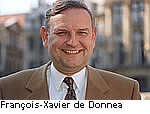Belgian presidency outlines research priority to MEPs
The head of the Research council, François-Xavier de Donnea, has highlighted the Belgian presidency's willingness to work with the European Parliament in setting in motion both the Sixth Framework programme and the proposed European research area (ERA). 'We will take the work forward concerning the new Framework programmes which are essential instruments in the creation of the ERA,' he said addressing the European Parliament's industry, trade, research and energy committee on 10 July. He went on to describe the detail of the five clearly defined research priorities of the Belgian presidency. These are the creation of a European research and innovation area, the new Framework programme, opening up Europe to the rest of the world, bringing science and society together and pursuing a European space policy. Regarding the ERA, Mr de Donnea said that the presidency will be taking up the reins from the Swedish presidency and will supporting the efforts of the European Commission. He emphasised the role of five key areas in the ERA which the Belgian presidency is hoping to advance; benchmarking; mobility; infrastructures; a community patent and; the role of the regions. The issue of benchmarking will come up at the Research council in December, according to Mr de Donnea. A conference on mobility has already been organised during the presidency, on 17 and 18 September and will also be discussed at December's Research council. On research infrastructures, Mr de Donnea said that the Belgian presidency will be working on the conclusions of the recent Research council which took place under the Swedish presidency. But he added that 'we also feel that collaboration should be improved in Europe for large scale infrastructure projects' and that infrastructures should be seen as intangibles as well as material entities. On the role of regions, Mr de Donnea said: 'The Belgian presidency is firmly convinced that the role of the regions in the setting up of the ERA should be clearly defined and reinforced.' On the Sixth Framework programme proposals, Mr de Donnea made a personal appeal to the European parliamentarians to work closely with the presidency and other European institutions so that the timetable for approval is respected. 'We would like to be able to bring a common position to the council of October. In effect, this timetable which presents all the guarantees for the Sixth Framework programme could be adopted under the Spanish presidency [beginning on 1 January, 2002],' he said. 'This is really about avoiding a hiatus between the Fifth and the Sixth Framework programmes.' Mr de Donnea emphasised that he knew what it was like to be an MEP and would use that knowledge in his dealings with the European parliament. 'I have every intention, throughout the presidency, of working in close contact with you, whether it be on the Framework programme or any of the other points raised by the council. I too have been an MEP and I am very sensitive to the need to reinforce the democratic dimension in the workings of the Union,' he told his audience of predominantly MEPs. The third presidency priority, of opening up Europe to the rest of the world, will be taken up by encouraging research links with third countries. Specifically, the Mediterranean and Mercosur countries were mentioned, but Mr de Donnea pinpointed that it should not matter whether links were with developed or developing countries. Reconciling science and society, the fourth priority, will be taken forward at the end of the year, when the Belgian presidency hopes to have the Commission plan of action entitled 'science and society' and will present its conclusions to the Research council in December. 'This will prepare the way for a definition of concrete measures aiming to reduce the gulf which seems to separate the scientific world from the citizen,' said Mr de Donnea. He also said that the presidency wanted to ensure that research was at the heart of decision making in related areas, such as health, food safety, sustainable development and energy. On the European space policy, Mr de Donnea reinforced the presidency's support for both the Galileo satellite project and the GMES environmental surveillance programme. Finally, he added that, although not included in the presidency's priorities, Belgium was aware of the importance of biotechnology in terms of its impact on industrial competitiveness and economic and employment growth.
Countries
Belgium



